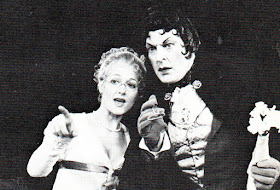 |
| Polly Adams, Donald Sinden. |
 |
| Donald Sinden, Anthony Pedley. |
One of a large number of British imports that dominated the
1974-1975 season, this hilarious revival of the 1841 hit comedy London Assurance, was written when its
Irish, English, and soon-to-be American author was only 19. It was brought to the
Great White Way well over four years after its successful London production by
the RSC. The star and much of the 1970 cast were intact.
One or two critics dismissed the play outright as mid-19th-century
balderdash, and its mounting as excessively campy. Martin Gottfried thought it
a “plainly mediocre” comedy given a “self-conscious and cute” staging. Many
more, though, said the show was a masterpiece of direction and performance,
despite the shallowness of the writing, while still others claimed Boucicault’s
play, especially in this modern adaptation, was, in John Simon’s words, “as
disarmingly insouciant, cheerfully inconsequential a piece of horseplay as ever
brightened one of our more trivial seasons.”
This is the tale of an aging, foppish, urban roué, Sir
Harcourt Courtly (Donald Sinden), his rivalry over sweet, young, country
heiress Grace Harkaway (Polly Adams) with his scapegrace son, Charles (Roger
Rees), and his dalliance on the side with the married horsewoman Lady Gay
Spanker (Elizabeth Spriggs). It was played to uproarious effect in a bright and
clever interpretation in which every player contributed to the “superb acting
ensemble,” said Jack Kroll.
 |
| Bernard Lloyd, Roger Rees. |
Chief among the actors was Donald Sinden, making his New
York debut, and acting his role with floridly roughed cheeks, outrageously
blackened wig with spit curls, and troublesome dentures that kept coming undone
whenever he said “devoir.” Sinden limned “a comic portrait of masterly detail
which requires no retouching. His poses in the pseudo-Japanese manner, his
pouter pigeon posturing, his disdainful stares, his ceaseless pretensions and
creaky gallantry . . . , all these and more comprise the consummate caricature
of a pompous ass,” observed John Beaufort. Each of the others was highly
commended, as was Ronald Eyre’s richly detailed comic direction, which made the
event “a triumph of style over content,” as Howard Kissell noted.
 |
| Elizabeth Spriggs. |
The production was rewarded with a Drama Desk Award for
Theatrical Experience, Sinden got one for Outstanding Performance, Spriggs
received a Tony nomination for Best Supporting Actress, Play, and Eyre was
nominated for Best Director, Play.